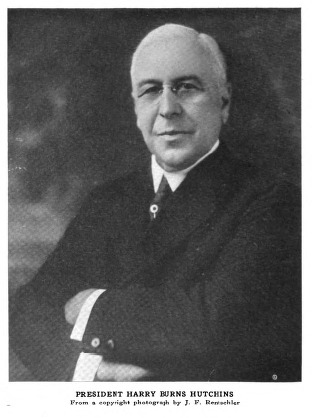Harry Hutchins
Born at Lisbon, New Hampshire, on April 8, 1847, Harry Burns Hutchins (1847-1930) was a U of M alumnus who later became the University president in 1910, and served throughout the period of the Great War. He finally retired on June 30, 1920, after some attempts to do so. Twice he tendered his resignation (in 1915 and in 1919), in compliance with the official expiration of his mandate, and twice the Board of Regents solicited for him to stay on, for reasons that were connected to the Great War expediency, and to a difficulty of finding his replacement. Twice also, he accepted to stay on.
Under Hutchins' presidency, the U of M community played a significant role at the local, national and global levels, in the successful conduct of the Great war, at least by the Allies. He was a busy president during this time of heated debates on campus regarding University policy towards war. He had to cope with several issues, ranging from dealing with dissenting voices, debates on compulsory military training on campus, disagreements between advocates of war and its opponents (pacifists), to organized campus meetings and talks on the war situation, to university changes accommodating the new dispensation of war induced activities. The university community late in 1915 upwards, including students and Faculties, was particularly pro-war, going to the extreme of favoring compulsory military training on campus, an issue he tackled with maximum tact and ingenuity.
Under his leadership and patriotism, the University introduced a course in military training in 1916, was home to several war related activities and training, such as harboring the training officers' corps, the reserved army corps, the war mechanics, and sending student enlistees to Camp Custer. It is fair to say that he helped in transmitting to the University community, including student draftees, the spirit and purposes of the war and the role of the US, in line with the general narrative within the national and international allied community that it was a war to safe democracy. On September 4, 1917, for example, while sending off the first student draftees for the National Army, to Camp Custer at Battle Greek, Hutchins stated that, "we are in this war to stamp out autocracy, to save democracy, and to make the world free for all people. You men who go forth to fight for your country should feel honored that you are chosen to uphold the principles for which your forefathers shed their blood; chosen to make assurance doubly sure that their heroic sacrifice was not in vain." The impact of Hutchin's speech on the minds of patriotic Americans, especially the student draftees themselves, cannot be missed. Shortly after his speech, and speaking on behalf of the drafted men, one Fred B. Wahr, said "we are proud to be the ones chosen to represent our country in this new army and in this great cause, for we understand thoroughly its justice before the world."
President Hutchins was particularly active during discussions on university's military preparedness, so that in November 1916, he attended the Conference of College and University Presidents, in Washington, D.C., for the purpose of discussing ways and means to establishing military courses in non-military colleges, as well as evaluating the associated problems of establishing military camps in several states. In addition, he served in a number of war related functions, including his appointment by President Wilson in 1915 as the American member of the International treaty between the US and Uruguay for the advancement of peace, his appointment in 1918 as a member of the Junior Red Cross advisory committee for the state of Michigan, and his election in 1919 as Chairman of the Governing Board of Trustees of the American University Union in Paris, an organization set up in wartime to deal with war related problems.
A simple and humble personality, with perhaps a fair sense of humor, at his resignation, one of Hutchins' friends fondly asked, "what are we going to call you, Mr. President, after you have resigned?", to which he characteristically replied, "Oh, you can just call me Harry then? On his retirement, a Michigan Alumnus issue judged his ten year tenure record to be worthy, and of solid achievement, full of coordination, and of foundations laid for future development . Hutchins, the fourth President of U of M, was succeeded by Dr. Marion LeRoy Burton, who became President on July 1, 1920. The University alumni, Board of regents, and community, saw him as a very successful president, who had shown great self-sacrifice and patriotism to the University, especially in time of difficulty and need. He died ten years after his retirement, in 1930.

